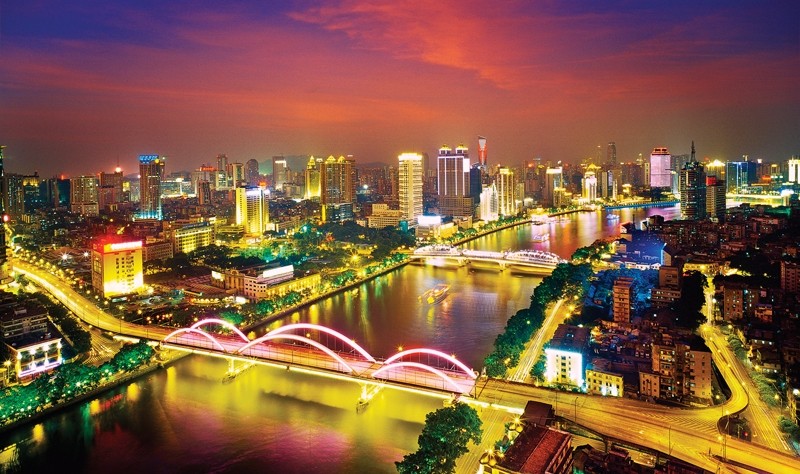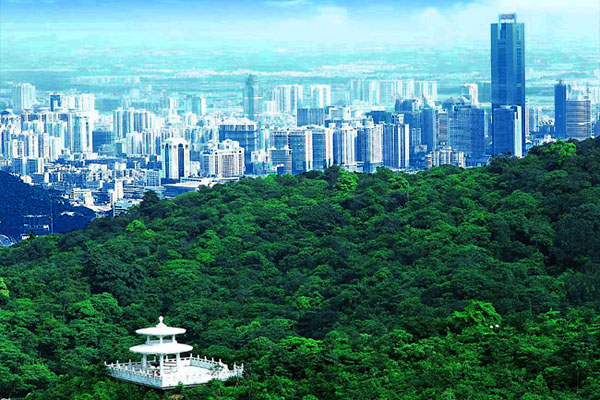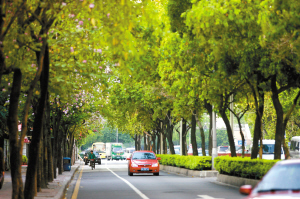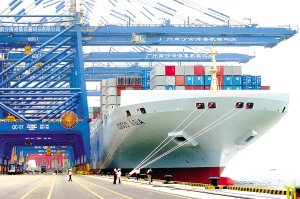Guangzhou

As one of the central cities of China and core cities of the Pearl River Delta, Guangzhou has long been the top choice for multinationals for investment deployment in China since China's reform and opening-up.
The Outline of the Plan for the Reform and Development of the Pearl River Delta (2008-2020) (the Outline) gave Guangzhou new roles, namely China's central city as well as a comprehensive portal city and a regional culture & education center; It also put forward that Guangzhou shall be built into the "best place" in both urban and rural Guangdong and an metropolis with international exposure and serving China as well. According to the Outline, Guangzhou will work to improve high-end elements clustering, scientific & technological innovation, cultural guidance and comprehensive service offerings, highlight the development of high-end service industries and accelerate the construction of advanced manufacturing bases, so as to intensify its role and enhance its influence as a central city of China. Based on the plan, it will take about ten years to develop Guangzhou into a metropolis with international exposure and serving China as well.
Profound Historical Connotations
As a 2,200-plus-year commercial city, Guangzhou has long been the maritime trade center since the Qin and Han Dynasties, and was the only foreign trade port city in the Ming and Qing Dynasties. Guangzhou rose, grew and flourished based on commerce and trade, which has far-reaching influence in the history.
Guangzhou is an important commercial center of China. With the goal of developing into an international commercial and trade center, it has worldwide reputation for hosting China Import and Export Fair, and the goods made in Guangzhou are sold across the globe. Relying on its unique geographical location and backed by the abundant Pearl River Delta, Guangzhou remains strong as a great oriental port despite twists and turns.
Economic Environment
Since China launched the reform and opening-up campaigns more than 20 years ago, Guangzhou's economy has been expanding at an average annual rate of 13%. Today, Guangzhou ranks third among major Chinese cities in terms of comprehensive economic strength. The city's industrial and agricultural production has been increasing constantly and foreign trade has been growing by leaps and bounds. Guangzhou is a central city in China's economic growth with a solid foundation in industry, a flourishing tertiary industry sector and balanced economic development.

Superior Geographical Location
Guangzhou has superior geographical and regional advantages. In terms of distance, Guangzhou is located in the geometrical center of the economic circle of Southeast Asia and therefore it is equidistant from Japan and Southeast Asian countries within a flight voyage of 3 to 4 hours in general.
In terms of geographical location, Guangzhou is an open coastal city neighboring Hong Kong and Macao, and the economic, political, and cultural center, and also the commercial center, which combines manufacturing, transportation, commerce, finance, information, education and human resources as a whole. It is located in the center of the Pearl River Delta, one of the most economically dynamic and flourishing areas in China. Guangzhou exerts an impact on China, East Asia and even the world with its economic capacity and radiation.
Beautiful Living Environment
Enjoying the reputation of "the City of Flowers", Guangzhou has won a series of awards these years, such as the National Habitat Award, the International Awards for Livable Communities, the UN Habitat Scroll of Honor Award, the European Favorite Tourist Destination in China and the first prize of the Compromiso México Water Prize by the World Water Forum. After hosting the 16th Asian Games in 2010, Guangzhou has been equipped with bluer sky, clearer waters, more sufficient traffic, lovelier communities and more beautiful urban landscape.
Taking pride in her profound historical and cultural resources, Guangzhou has been among the first batch of cities who has been awarded title of National Famous Historical and Cultural City. She is known as the core area of Lingnan Culture, the place of origin for the ancient Maritime Silk Road, the cradle of the democratic revolutions and the pioneer of implementing the policy of reform and opening up. Since ancient times, Guangzhou has always been the most famous commercial port in South China. She is also the earliest trading port in China and has never been shut down since her establishment. Guangzhou has been the only trading port in China before the opening of other ports and when the "one port policy" was implemented since 1757 to about 1837. Also known as Canton, Guangzhou is of global influence. The commercial culture highlights her urban features. Thanks to the exchanges and trades with the outside world through the years, Guangzhou has become increasingly open and acceptant. Since the implementation of the policy of reform and opening up, Guangzhou has further featured her pioneer, pragmatic and enterprising spirit and has taken the lead to establish close ties on economy and trade with countries and regions all around the world.

After the magnificent 16th Asian Games and the first Asian Para Games, the spirit of the city has been enriched with new content in the new era, namely adventurousness, flexibility, people-orientation and the concept of "together we can make it better". There are a variety of splendid international sports and cultural events all the year round, including the Guangzhou International Documentary Film Festival and the China Music Festival. Renowned for its fresh materials, fine cookery and refreshing taste, Cantonese cuisines have won the heart of chowhounds worldwide.
Great Blueprint
Approved by the Guangzhou Municipal Government, the Guideline for General Strategic Planning of Guangzhou City Development (Abbr. the Guideline), which depicting the blueprint of the following 20 years' ecological development of Guangzhou is now been fully implemented. Mr. Gao Dianying, deputy director of the Development Planning Commission of Guangzhou Municipality briefed the reporter on the relevant content of the Guideline.
● Prospect of Guangzhou: a blueprint of an ecological environment ideal for business and living
The construction of building Guangzhou into an ecological city is divided into 3 phases, including phase I (by 2005), phase II (by 2010) and phase III (by 2020).
The Guideline presents a general description of the content of building Guangzhou into an ecological city, painting a blueprint of an ecological environment, which is adapted for business and living. By 2005, a "landscape city" is to appear. The fundamental ecological planning will be finished and the basic configuration of an ecological city and its communication networks are to be shaped. Afforestation network is to be roundly established and waters are to be cleaned. The construction of the new and the old urban areas will be primarily completed. Before 2010, a garden city will be basically built up: ecological zones are to be constructed in the round, the quality of the city's ecological and living environment are to be enhanced by leaps and bounds. Numbers of horticultural plazas will be built, and with clear functional subarea, a landscape consists of ecological scenery and the architectural ensemble with the "South Ridges" flavor is coming into being.
By 2020, Guangzhou as a whole will become an international ecological city with a territorially "South Ridges" flavor which combines the splendent art of the eastern and western architecture and the poetry connotation: the old city, being ecologically reconstructed, will become the most extensively afforested city in China; while the new city and the Greater Nansha will become the central of Guangzhou, for with convenient transportation, they are the new urban areas that fully embodying the meaning of landscape and garden cities.
Powerful Market Stimulating Effects
As the central city of South China and the Pearl River Delta, one of China's top three economic powerhouses, Guangzhou has long played an essential role in stimulating the economic development of the South. With the formation of the China-ASEAN Free Trade Zone, Guangzhou's status as an economic hub will grow and its stimulating effects on economic growth will expand throughout Southeast Asia; this will open up enormous business opportunities for multinational companies operating in Guangzhou.
Comfort and Convenience of Transportation
Guangzhou enjoys sufficient infrastructures, which reinforces her position as a comprehensive gateway city.
Handling more than 48.3 million people and achieving the fastest rise on the global list of passenger traffic, the Guangzhou Baiyun International Airport was the 2nd busiest airport in China and the 18th busiest airport in the world in 2012. There 105 international routes and 507 domestic ones connecting 124 cities around China and 59 cities in 31 countries and regions around the world. The Baiyun Airport is making steady progress in serving as an international airline hub.
As to the construction of the international shipping center, the Guangzhou Port Group comprises 56 berths for vessels of over 10,000 tonnes and 13 berths for vessels of over 100,000 tonnes. Its international maritime trade reaches over 350 ports in more than 80 countries and regions worldwide. In 2011, the Port of Guangzhou ranked 6th and 7th in the world respectively in the cargo throughput and the container throughput. According to the economic operation analysis by the Municipal Statistics Bureau, the cargo throughput has reached 451 million tons and it has handled 14.71 million TEUs in 2012. The Nansha Port in Guangzhou Port is currently the largest container port serving domestic trade in China.
As to the construction of the modern land transportation network, efforts have been paid to improve the inter-city railways, expressways and the Bus Rapid Transit System (BRT). The Guangzhou South Railway Station becomes increasingly important as a railway passenger transportation hub in China. The modern sea-land-air transport network has been taken shape, which facilitates the city's connection with the world and reinforced the Guangzhou's leading role as one of the central city in China.

Efficient Customs Clearance
The pilot project of reforming the customs clearance mode in Nansha District has been energetically advanced. The Demonstration Zone of Cooperation on Customs Clearance among Guangdong, Hong Kong and Macau has been built up to strengthen communications and exchanges. Examination and management have been innovated. Efforts have also been paid to explore the mutual recognition and sharing of the inspection information.
Progress has been made in the reform of classified clearance in accordance with category of the applied companies. New measures have been introduced including territorial management and electronic application and examination. The cargo inspection facilities at the ports have been improved. The Port of Guangzhou has been further opened and its dedicated area for vehicle import has been extended. The cargo inspection facilities have also been updated in the free trade zones in Guangzhou Baiyun International Airport and in Nansha Port.
Measures have been taken to facilitate custom clearance. Ports in Guangzhou have launched the pilot project of inspection for only once for each application and clearance upon finishing inspection. The work coordination group has been set up for "the bidirectional facilitated clearance of yachts in Guangzhou, Hong Kong and Macao".
The information technologies have been further explored. The Guangzhou E-port has been the unitary logistics information platform for customs clearance in Guangzhou. Thanks to the joint support from the General Administration of Customs and the Data Center of the China E-port, both the intranet and extranet of the inspection system have been developed and put into operation. The new manifest system has been put into use. It has been encouraged to apply the checkpoint system at the customs supervision sites at the ports of Guangzhou. The Station of Exit and Entry Frontier Inspection has improved the real-time monitoring of vessels, the inquiry service of the port information and the real-time detection system of exit and entry frontier information. The cruises inspection and supervision system has been introduced. The auto inspection system of exit and entry frontier information has been applied at the service windows. The electronic application system for vessels inspection has been promoted. The wireless intelligent supervision of stairway of the vessels has been achieved. The construction of the new supervision points for customs clearance of passengers and at A-class cargo harbors.
Powerful business promotion carriers
Guangzhou is the only city at home that accommodates three national-level economic & technological development zones. Guangzhou Economic and Technological Development Zone highlights its construction as a modern, new city area suitable for both business startup and living and a sub-city center in East Guangzhou. At present, the Sino-Singapore Knowledge City is built at an accelerated pace with the purpose of developing into a landmark region demonstrating the knowledge economy in the 21st century and urban image of Guangzhou. Nansha Economic and Technological Development Zone focuses on the construction as “China’s first-class modern and international port economic circle” and “a modern coastal new area suitable for both business and living”. It beefs up effort to develop such intelligent industries as the networks of things, energetically explores the construction of bulk commodity trading centers and South China’s major logistics bases relying on Nansha Bonded Port, and strives to build itself into a world-famous node in cruise tour route. Zengcheng Economic and Technological Development Zone is a state-level development zone newly approved by the State Council with the focus on auto, manufacturing as well as emerging industries. The said three state-level economic and technological development zones will have tremendous attractions to foreign-funded companies, Global 500 companies in particular.
Powerful industrial clusters
Guangzhou is a major industrial base, manufacturing base and service industrial base in China, with complete industrial supporting facilities and clusters. In particular, the three pillar industries, namely auto, petrochemicals and electronic information, have seen the establishment of modern industrial systems. Besides, its tertiary industries like finance, wholesale & retail, logistics, exhibition and tourism are developed, too. The modern industrial system, in which modern service industries take the dominant position, high-tech industries serve as the engine, advanced manufacturing develops at an accelerated pace and competitive traditional industries upgrade, is taking shape.
Guangzhou has appraised as the "national base for auto and parts export", "national electronic information industrial base", "national pharmaceuticals export base", "national bio-industrial base", "national software industrial base", "national online animation industrial base", "national software export innovation base", "national base for new materials for environmental protection under the Torch Plan", "national high-tech industrial base for the IT industry", "national high-tech industrial base for the new material industry" and "China's service outsourcing base city (demonstration city)", etc.
A huge consumer market
Guangzhou is a huge consumer market, boasting 364.8 billion yuan of citywide retail sales of consumer goods in 2009 and directly leading the consumption concepts and fashions of over 40 million relatively affluent groups in the Pearl River Delta.
The people flow, material flow and capital flow diverted by the Asian Games 2010 to Guangzhou surely will lead to the further flourishing of local consumer market. Meanwhile, Guangzhou will lead the consumption in the high-speed railway era through innovative consumption modes, and give better play to its role as China's central city in "resource gathering and distribution" so as to become the consumption center of South China and influence Central China.
Plentiful Foreign Trade Wholesale Markets
Guangzhou has built a wholesale market system with complete functions covering the entire nation and is linked to the international marketplace. In 2006, the city was home to 586 wholesale markets including 115 sizable ones.
Its wholesale markets for aquatic products, audiovisuals, tea, leather products, textiles and garments, hotel supplies, cosmetics, auto accessories, IT products, toys and gifts and others are among the largest ones of their kinds in China. "Guangzhou prices", which have a considerable influence on the industries serving these markets, are typified by the Guangzhou Anhuamei Expo City, the Guangdong Audiovisual City, Huangsha Aquatic Products Wholesale Market, the Baima Garment Market, the South Tea Market, the Shiling Leather Products City, the Guangdong Yuzhou International Building Materials Market, the Guangdong Tianjiian International Home Furnishings Materials Market, and Pacific Computer City all enjoy considerable name recognition in China and Southeast Asia.
Fair Trade Protection
In 2012, there have been 28 cases of international trade friction against products from Guangzhou, involving over 190 export-oriented enterprises and an amount of about 230 million USD. The countries and regions which have initiated the investigations include the Europe Union, the United States, Canada, India, Australia and Peru. Efforts have been paid to energetically construct the work system of trade remedy in accordance with the WTO rules, which have helped the enterprises in Guangzhou deal with international trade friction and have contributed to the protection of fair trade. The mechanism joining the governmental departments, the industrial organizations and the involved enterprises has been set up to deal with international trade frictions: the government offices have provided the respondent enterprises with ad hoc legal trainings, professional legal consultation services, guidance on legal procedures, prevention strategies and practical operations, and analysis on hot issues; the chambers of commerce and the industrial associations have helped organize indictments answering, select and hire lawyers and respond with a demurrer on behalf of the whole industry; the respondent enterprises have actively protected their rights and interests.
The monitoring and early warning mechanism has been established through which relevant government offices provide the key export-oriented enterprises with prevention information and risk management services. In 2012, four volumes of briefings on fair trade have been compiled, over 30 early warning messages have been sent and over 300 items have been involved in products monitoring. Led by the City of Guangzhou and joining 9 cities in the Pearl River Delta Region with relatively advanced economy and similar industrial structure, the cooperation mechanism has been set up to jointly collect and share information, answer indictments, hold training and organize special researches. Guangzhou has taken to lead in China to establish the Technical Barriers of Trade (TBTs) which involve various government departments and are technically supported by the municipal Notification and Inquiry Center. To boost the key industries of the city, efforts have been paid to undertake friction forecasting and early warning under the TBTs scheme, cases notification and appraisal, exchanges and cooperation, publicity and training, customized service, database construction and special researches.
Intellectual Property Rights Protection
Efforts have been paid to improve the legal system of intellectual property rights protection and a series of regulations have been issued, such as the Measures of Guangzhou Municipality for Handling Patent Infringement Cases, the Measures of Guangzhou Municipality for the Protection of Intellectual Property Rights during Exhibitions and the Measures of Guangzhou Municipality for Rewarding for Reporting Patent Infringement. Guangzhou has taken the lead in China to set up the Mayor's Award for Intellectual Property Rights Protection and has held the annual Guangzhou Municipal Patent Award for years to promote public awareness on IPR protection. Judicial protection has been strengthened. Since September 2012, Guangzhou has launched the pilot project that civil, criminal and administrative cases are all handled by the IPR Protection Court at both the municipal and district levels to maintain unitary judicial criterion. The system of the enforcement of administrative laws has been improved. Special actions have been taken to crack down on the IPR infringement in line with the work plans of the State Council and the provincial government. Guangzhou is among the first batch of cities which have won the title of the "National Demonstration City of IPR Protection" in 2012.
Effective Administrative Services
All government departments in Guangzhou have endeavored to improve the efficiency of administrative services and simplify the examination and approval. Most of the departments involving investment and construction application have shorten the examination and approval by 30%, including the Municipal Bureau of Foreign Trade and Economic Cooperation, the Municipal Administration of Industry and Commerce, the Municipal Land Resources and Housing Administrative Bureau, the Municipal Bureau of Urban Planning and the Municipal Urban and Rural Construction Commission. Guangzhou has taken the lead in China to integrate social and economic development planning, land and resources planning and urban planning. The applications have been unified for construction projects and for land use management and unitary examination and approval have been implemented for construction projects within the city.
The State Administration for Industry and Commerce has given full support to Guangdong Province to take the lead and reform the business registry. As one of the cities to launch the pilot project, Guangzhou is researching on the measures and arrangements. The purpose of the reform is to facilitate the registration for setting up business and simplify the application in line with the principal of "lenient admission and strict supervision". E-government services, such as online application, paralleled examination and one-stop document submission, have been promoted on the websites of the Municipal Government, departments at municipal levels and governments at district (county-level cities). The online services have been enhanced including appointment making, consulting, case submission and acceptance, examination and approval, and notification upon completion. The interaction with the people has been innovated and the people's involvement and participation in government through the internet have been encouraged.
Rich Human Resources
At present, there are 79 colleges and universities in Guangzhou. 26 universities and research institutions offer graduate programs. The number of graduate students at school reaches 69,800; the number of students at universities and colleges is 896,100; and the number of students at secondary vocational school is 248,600. Guangzhou is the most influential city in South China in terms of higher education.
By the end of 2012, the number of employers who have been equipped with a college degree or above has reached 2.61 million. There have been 1.26 million professional and technical personnel. Guangzhou has ranked third in China in human resources aggregate and has had the highest growth rate in recent years. There have been 77 academicians from the national Academy of Sciences Academy of Social Sciences, 31 candidates for the national level "New Century Hundred-Thousand-Ten Thousands Personnel Scheme", and 3823 personnel eligible for special government allowances. Over 50,000 foreign experts have visited Guangzhou each year for academic exchanges. In line with the implementation of the strategy of rejuvenating the city through sciences and technologies, efforts have been paid to improve the policies and the innovation platform. The innovation of sciences and technologies and the hi-tech industries have been enjoying sustainable and rapid development.
Progress has also been made in bridging the gap with the developed countries and regions in the investment of research and development and in sciences and technologies.
Breakthroughs have been made in high power LED, high-end interchangeable core chips, 4G LTE (long-term evolution) wireless communication of high-speed data, RFID, car engines of self-own brands, high-end numerical control processing equipments, energy-efficient equipments, new drugs and medicines, stem cells technologies, and bio-medicine engineering, etc. A series of core technologies and important products with independent intellectual property rights have been developed.
Environmental Protection
Guangzhou won the "Nations in Bloom" award in 2001 and the Dubai International Award for Best Practices to Improve the Living Environment in 2002. Guangzhou gives a high priority to environmental protection and has drawn up a series of provisions and standards in accordance with national and provincial environmental laws and regulations. The city institutes a rigorous review and approval system for all aspects of construction projects which suggest that they may cause pollution and has implemented a licensing regime for discharge of water and air pollutants.
Source: Guangzhou International (English.gz.gov.cn) http://english.gz.gov.cn/gzgoven/s3683/buslisttt.shtml



